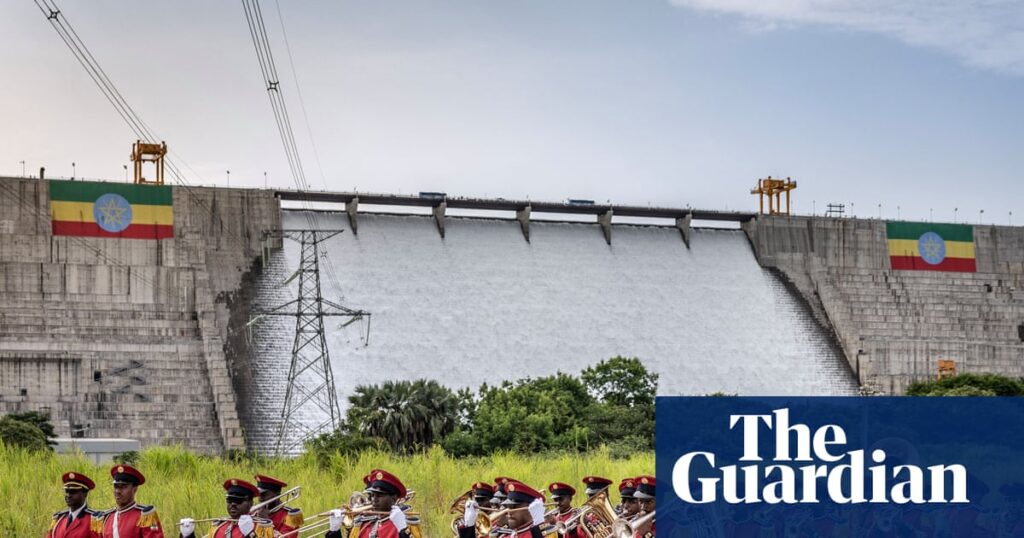
Ethiopia has officially inaugurated Africa’s largest hydroelectric dam, a monumental project that promises to revolutionize the nation’s energy landscape. However, this development may further strain relations with neighboring Egypt, which relies heavily on the Nile River for its water needs.
State media broadcast images of Ethiopian Prime Minister Abiy Ahmed touring the Grand Ethiopian Renaissance Dam (GERD) site in the Guba district. He was accompanied by the Kenyan president, William Ruto, the Somali president, Hassan Sheikh Mohamud, and the African Union chairperson, Mahmoud Ali Youssouf. During the inauguration ceremony, Abiy addressed dignitaries, emphasizing the dam’s purpose. “To our brothers, Ethiopia built the dam to prosper, to electrify the entire region and to change the history of black people,” he declared. “It is absolutely not to harm its brothers.”
The Strategic Importance of GERD
The GERD, which began construction in 2011, is a massive infrastructure project situated on the Blue Nile, one of the two principal tributaries of the Nile River. Standing 170 meters (550 feet) tall and spanning nearly 2 kilometers (1.2 miles) across, the dam is engineered to hold 74 billion cubic meters of water and generate 5,150 megawatts of electricity. This output more than doubles Ethiopia’s current energy capacity, marking it as the largest power-generating dam in Africa and among the top 20 globally.
Costing approximately $5 billion, the dam’s funding was primarily sourced from Ethiopia’s central bank, which contributed 91% of the total. The remaining funds were raised through bond sales and donations from Ethiopian citizens, as reported by local media.
Regional Tensions and Diplomatic Challenges
The inauguration of GERD has not been without controversy. Egypt, a nation of over 100 million people with minimal rainfall, depends on the Nile for 97% of its water supply. Egyptian authorities fear that the dam could significantly reduce water flow during drought periods, threatening their water security.
Egyptian President Abdel Fattah al-Sisi has consistently described GERD as an “existential threat,” asserting that Egypt will defend its water rights vigorously.
“Whoever thinks Egypt will turn a blind eye to its water rights is mistaken,” he stated last month.
Tamim Khallaf, a spokesperson for Egypt’s foreign ministry, reiterated this stance, noting that Egypt would continue to monitor developments and “exercise its right to take all the appropriate measures to defend and protect the interests of the Egyptian people.”
Meanwhile, Sudan, which shares Egypt’s concerns, has also called for legally binding agreements regarding the dam’s filling and operation. However, Sudan could potentially benefit from improved flood management and access to affordable energy.
Ethiopia’s Perspective and Future Prospects
From Ethiopia’s viewpoint, the GERD represents a sovereign right and a pivotal opportunity for national development. The government has previously assured that the dam would not significantly harm downstream countries. Prime Minister Abiy reiterated this sentiment in July, stating,
“The Renaissance dam is not a threat, but a shared opportunity. The energy and development it will generate stand to uplift not just Ethiopia.”
Independent studies have so far indicated no major disruptions to downstream water flow, attributed to favorable rainfall and cautious reservoir filling during wet seasons over the past five years.
Looking Ahead
As Ethiopia moves forward with the GERD, the diplomatic landscape in the region remains tense. Egypt has strengthened ties with Eritrea and Somalia, countries that have historically had strained relations with Ethiopia. The situation underscores the complex interplay of regional politics, resource management, and national interests.
The successful operation of the GERD could potentially transform Ethiopia into a regional energy hub, fostering economic growth and regional cooperation. However, achieving a diplomatic resolution with Egypt and Sudan remains crucial to ensuring long-term stability and mutual benefit.
As the situation evolves, the international community will closely watch how these nations navigate the challenges posed by the GERD, balancing national interests with regional cooperation and environmental sustainability.






